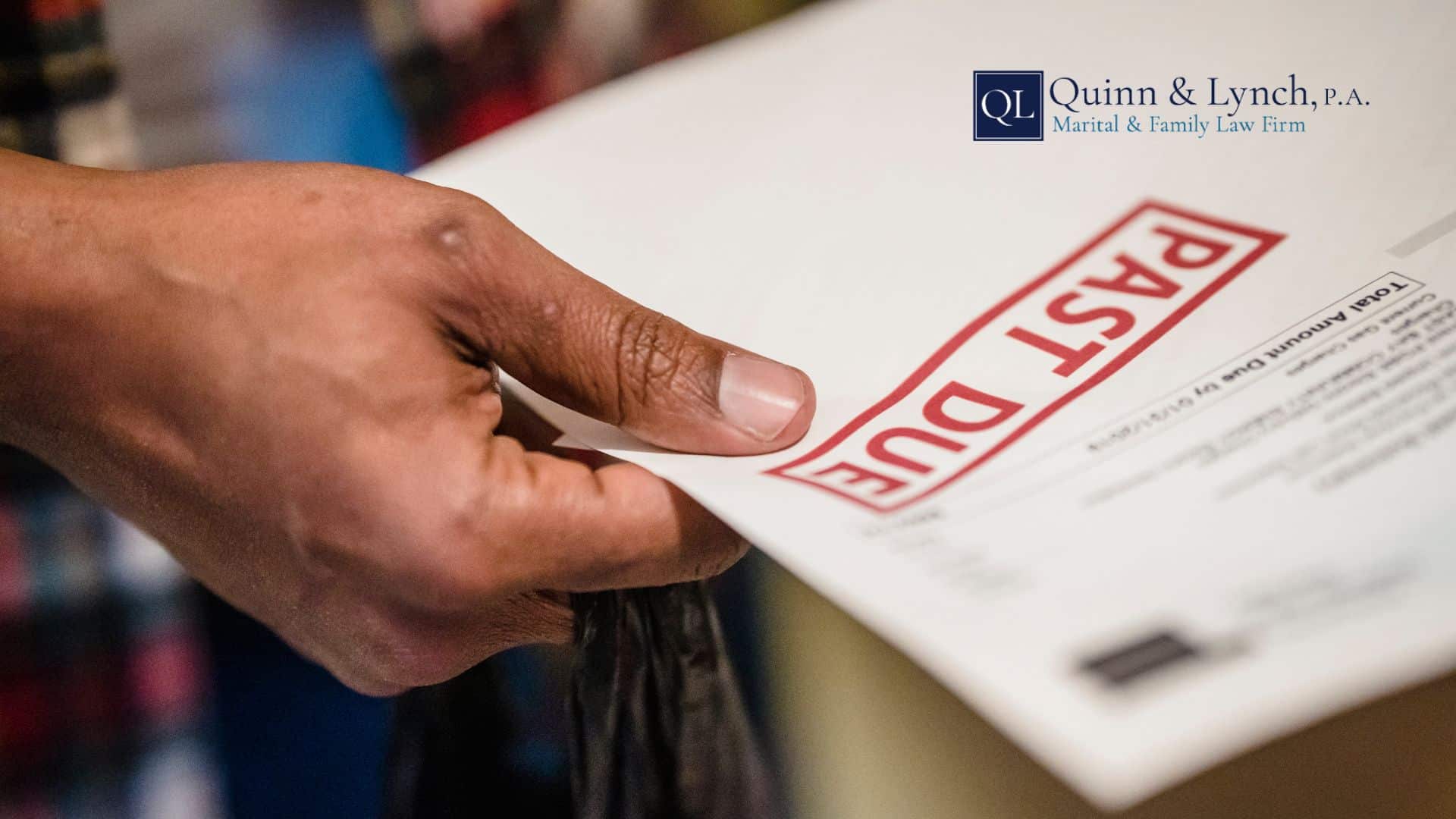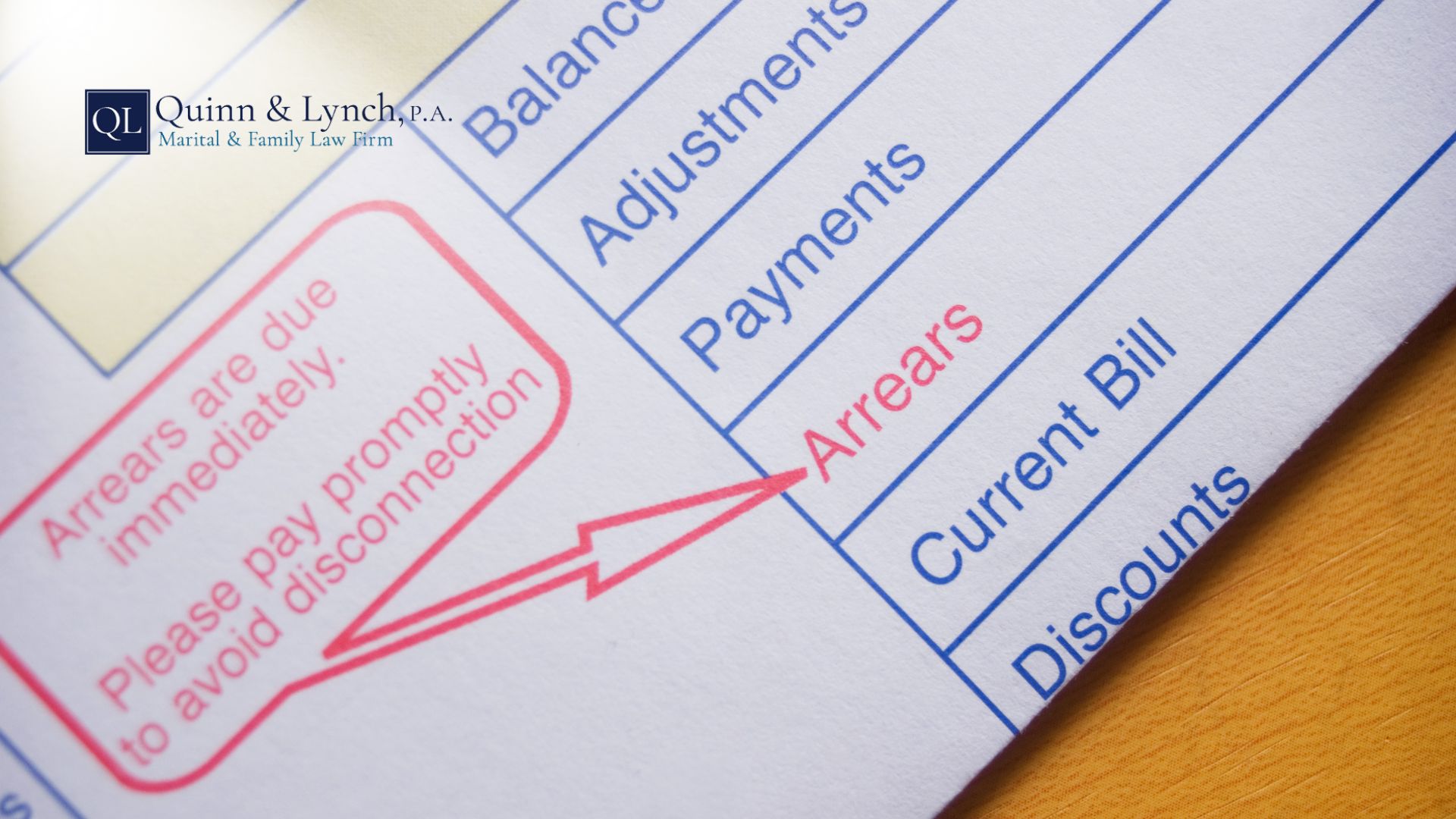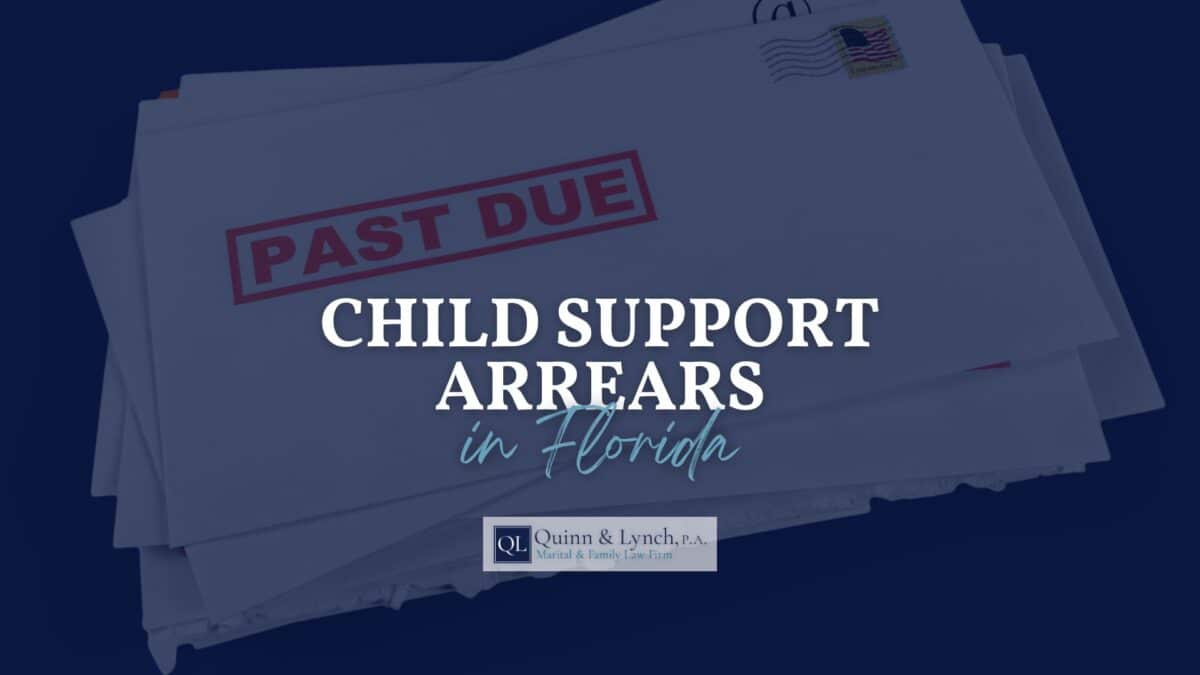Florida child support arrears can lead to serious legal and financial consequences for parents who fall behind on their child support order. Under Florida law, parents have a legal obligation to provide for their child’s financial needs, and failure to comply can result in back child support, wage garnishment, driver’s license suspension, and even jail time.
Whether due to financial hardship or disputes with the other parent, navigating the legal process of child support enforcement requires a clear understanding of both state and federal law. Courts consider factors such as child custody arrangements and income levels when determining child support agreements through Florida’s child support program. If you are struggling with Florida child support arrears, need to modify a child support order, or are facing enforcement actions, a Tampa family law attorney can help.
Contact our attorneys today at 813-223-7739 for experienced legal guidance.
Child Support Arrears Florida: Understanding Your Legal Options
Florida child support arrears occur when a parent fails to make child support payments as required by a child support order. Failure to make child support payments can result in legal penalties, including wage garnishment, asset seizure, and suspension of licenses.
Under Florida law, the Florida Department of Revenue and child support enforcement agencies work to recover child support by tracking payments through the state disbursement unit. A non-paying parent may face serious legal repercussions if they do not pay child support as required. Family law courts can take legal action, enforce retroactive child support, and take steps to ensure child support obligations are met. If you have child support arrearage, understanding your legal options is critical to avoiding severe penalties.
Past Due Child Support Payments vs. Retroactive Child Support in Florida
Under Florida statutes, there is a difference between past-due child support and retroactive child support. Past due child support refers to support arrears that accumulate when a parent fails to comply with a child support order, while retroactive support refers to money owed before the order was established. A child support hearing may be required to determine child support arrears and calculate how much money owed should be paid. Courts evaluate the child support agreement, the financial history of one parent, and the needs of the minor child when making decisions on support arrears.
What is Back Child Support?
Back child support refers to child support payments that are past due because a parent failed to pay under a court-ordered child support obligation. Florida back child support payments accrue when a parent does not pay child support on time or in full as required by a child support order. This continues to accumulate until the back child support owed is paid in full.
- Back child support is legally enforceable: Under Florida law, courts and the Department of Revenue can take legal action to collect back child support.
- Back child support does not go away automatically: Even if the child turns 18, the child support order remains until all back child support is paid.
- Back child support can lead to penalties: A non-paying parent may face wage garnishment, bank account seizures, license suspension, and even jail time for failure to pay.
- Back child support is different from retroactive child support: Retroactive child support refers to payments owed for the period before a child support order was officially established, while back child support accumulates due to nonpayment of an existing child support agreement.
If a parent owes back child support, they may seek modifications with the legal assistance of a Tampa child support modification lawyer. However, as a general rule, the back child support associated with prior legal obligations remain enforceable until the non paying parent is current.
What Happens When a Parent Fails to Pay Child Support in Florida?

When a parent fails to meet their legal obligation, the Florida child support enforcement program takes legal action.
Some enforcement measures include income withholding, seizure of bank accounts to collect child support arrears, interception of tax refunds for unpaid child support payments, suspension of driver’s licenses for a non-paying parent, and garnishment of lottery winnings if back child support payments exist.
Florida courts take child support matters seriously and will pursue aggressive enforcement against non-paying parents who fail to comply with court orders.
Whether you’re the custodial parent trying to hold the non-paying parent accountable, or if you’re the other parent who’s struggling to pay child support, a Tampa child support enforcement lawyer can help.
Income Deduction Orders for Florida Child Support Arrears
Income deduction is a tool used to ensure a non-paying parent meets their legal obligation for child support payments under Florida statutes. This legal process allows employers to withhold child support payments directly from wages. Florida child support enforcement uses income withholding as a primary method of recovering back child support arrears. This ensures that child support agreements are met before funds reach the non-paying parent’s bank account.
If the other parent is refusing to pay child support arrears. Florida courts will use this legal process to help the custodial parent receive repayments for ongoing child support arrears.
Imputed Income for Florida Child Support Arrears
Imputed income in Florida child support arrears cases occurs when a family law court assigns an income value to a parent who is unemployed or underemployed. Imputed income for child support in Florida ensures that one parent cannot avoid child support orders by intentionally earning less than they are capable of.
Courts may impute income based on past earnings, education level, work history, job market conditions, and overall ability to work. If a parent is found to be voluntarily unemployed or not making a reasonable effort to find employment, the court will determine a fair income level and base child support orders on that amount. This prevents non-paying parents from evading financial responsibility.
Writ of Bodily Attachment for Florida Child Support Arrears
A Writ of Bodily Attachment in Florida is a legal obligation issued when a parent fails to comply with a child support order, often due to back child support arrears. This writ authorizes law enforcement to arrest the non-paying parent and bring them before the court to address back child support.
Typically issued in contempt of court cases, the writ allows a judge to enforce back child support actions by detaining the non-paying parent until they pay child support or agree to a payment plan.
In many cases, the court sets a purge amount, which is a specific sum that must be paid for the parent to be released from custody. Failing to resolve Florida child support arrears under a writ of bodily attachment can result in extended jail time and additional legal processes to ensure compliance.
How the Florida Department of Revenue Tracks Child Support Payments

The Florida Department of Revenue monitors child support payments through its disbursement unit, ensuring compliance with child support agreements.
If a parent misses payments, the department can take legal recourse, such as freezing bank accounts to recover past due amounts, intercepting lottery winnings for unpaid support arrears, and reporting non-payment to credit bureaus. The Florida child support program uses these enforcement tools to track child support obligations and take legal recourse when necessary.
Legal Consequences of Child Support Arrears: Florida
Under Florida law, failing to comply with a child support order can lead to severe legal penalties, including jail time for noncompliance with a court order, garnishment of wages, suspension of professional licenses for a non-paying parent, and seizure of property for unpaid child support arrearage.
Florida courts will take legal recourse to ensure child support enforcement is carried out effectively.
How Much Back Child Support is a Felony in Florida?
Our attorneys are often asked questions regarding how far behind in child support before a warrant is issued in Florida?
For Florida child support arrears, failing to make child support payments can escalate to a felony charge under specific conditions.
- Amount Owed and Duration: If one parent is over $2,500 behind in child support payments and has not made payments for four consecutive months, they may face felony charges.
- Prior Convictions: A parent with previous enforcement convictions can be charged with a felony if they fall behind again.
- Attempting to Avoid Payment: Leaving the state to avoid child support orders can lead to felony charges, especially if the amount owed exceeds $5,000 or back child support payments have been overdue for more than one year.
Florida child support arrears are handled seriously under Florida law, and legal recourse is aggressively pursued against non-paying parents to ensure compliance with child support orders.
What is a Motion to Dismiss Child Support Arrears: Florida?
A motion to dismiss child support arrears allows a parent court-ordered to pay child support to challenge support arrears due to miscalculations or incorrect child support payments.
A family law judge may dismiss past due child support if payments were made but not recorded by the Florida Department of Revenue, the custodial parent agrees to waive child support arrears, or errors in the child support order are proven.
When Are Parents Entitled to Challenge Florida Child Support Arrears?
An obligated or custodial parent can challenge a motion to dismiss child support arrears by proving that child support payments were made or that the child support obligation was miscalculated. The other parent can oppose the motion if they believe support payments are still legally owed.
When Family Courts Consider Equitable Considerations
Florida courts apply equitable considerations when adjusting child support arrears based on the financial needs of the minor child, hardship of the obligated parent, and past financial contributions of one parent. These factors help determine if child support arrearage should be reduced or enforced.
How to Terminate Child Support Arrears: Florida?
To terminate child support arrears, Florida parents must file a motion in family court, proving that child support payments were miscalculated, financial hardship prevents the parent from paying, or the final judgment needs modification.
Florida Child Support Arrears Forgiveness Program
There is no official Florida child support arrears forgiveness program, but courts may consider equitable considerations in certain cases. If the other parent agrees to waive past due amounts, the court may approve modifications.
When Can Retroactive Support Be Waived?
Retroactive child support may be waived if the parent entitled to support delayed seeking payments, both parents resided in the same household, or the child support order was issued incorrectly. However, family law courts typically uphold child support obligations unless compelling reasons exist.
What Happens to Child Support Arrears When Custodial Parent Dies in Florida?
If the custodial parent dies, Florida child support arrears remain owed. The balance is redirected to the other parent, the child’s guardian, or the state disbursement unit to support the minor child.
Are Florida Property Taxes Paid in Arrears?
Yes, Florida property taxes are paid in arrears, but child support arrears in Florida accumulate separately, resulting from unpaid child support obligations.
Tampa Child Support Arrears Lawyer
If you need help resolving child support arrears in Florida, a Tampa child support lawyer can assist with modifying a child support order, defending against legal action for back child support, and protecting your parental rights in child support matters. For guidance on Florida child support arrears, contact an attorney today.















